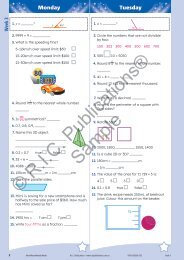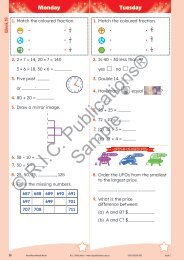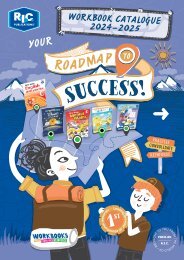RIC-20234 Primary Grammar and Word Study Year 3 – Parts of Speech
Create successful ePaper yourself
Turn your PDF publications into a flip-book with our unique Google optimized e-Paper software.
<strong>Parts</strong> <strong>of</strong> speech<br />
Adverbs<br />
Focus<br />
Common adverbs <strong>of</strong> place <strong>and</strong> interrogative adverbs<br />
Definitions<br />
• An adverb is a word that adds information, usually<br />
to a verb <strong>and</strong> can tell how (manner), when or where<br />
something happens.<br />
Example:<br />
Earlier (time), the ranger had sternly (manner)<br />
warned the campers not to swim there (place).<br />
• An interrogative adverb asks questions about how,<br />
when, where or why something happens.<br />
Note: Adverbs can modify any words that are<br />
not nouns or pronouns. (These are modified by<br />
adjectives.)<br />
Explanation<br />
• Adverbs can clarify meaning by telling more about<br />
the action, allowing for greater precision <strong>and</strong> adding<br />
interest to writing.<br />
• On the worksheet, common adverbs have been<br />
classified as those that add information about<br />
manner, time or place, but there are other<br />
categories such as: adverbs <strong>of</strong> frequency;<br />
e.g. usually <strong>and</strong> seldom <strong>and</strong> adverbs <strong>of</strong> extent;<br />
e.g. quite <strong>and</strong> almost. These other categories could<br />
also be discussed with students.<br />
• Although adverbs <strong>of</strong>ten answer the questions how,<br />
when <strong>and</strong> where about the verb, the actual words<br />
how, when, where <strong>and</strong> why are themselves<br />
adverbs. They are known as interrogative adverbs.<br />
Worksheet information<br />
• Introduce the worksheet by discussing occasions<br />
when students, family members or friends have<br />
had to search for something, <strong>and</strong> ask students to<br />
describe how the people involved were feeling <strong>and</strong><br />
behaving at the time. Did they try to blame each<br />
other for whatever was missing?<br />
• Remind students that identifying adverbs is made<br />
easier by first finding the verbs.<br />
• Read the text. The students should then locate <strong>and</strong><br />
circle all the verbs. (See pages 6<strong>–</strong>11 to revise verbs.)<br />
• Model asking the ‘where’ question after each verb.<br />
For example, ‘Does the text tell where the sneaker<br />
has disappeared? (No) ‘Does the text tell where I’ve<br />
searched?’ (Yes, so here is the adverb <strong>and</strong> should be<br />
underlined.) Students should complete Question 1.<br />
• Explain that if the answers for Question 2 are located<br />
in the text, they should be used; but if not, students<br />
will need to use their imagination <strong>and</strong> make up<br />
some appropriate adverbs. For example, ‘How<br />
would Mum have checked?’ (carefully? crossly?<br />
impatiently?)<br />
• Before students complete Question 4, they will<br />
need to underst<strong>and</strong> that all the words in the box are<br />
adverbs. Some teachers may choose to introduce<br />
the term interrogative adverb <strong>and</strong> to explain<br />
that these question words are themselves special<br />
adverbs. Encourage students to choose the adverbs<br />
wisely as some words will fit in more than one space<br />
<strong>and</strong> each word should only be used once.<br />
Ideas for further practice<br />
• Students work in small groups to highlight verbs on<br />
a newspaper or magazine page then list any adverbs<br />
used in the text to modify them.<br />
Answers<br />
1. The following adverbs <strong>of</strong> place should be<br />
underlined: here, there, upstairs, down, inside,<br />
outside, near, far, everywhere, <strong>of</strong>f<br />
©R.I.C. Publications<br />
Low Resolution Images<br />
Display Copy<br />
2. (a) Teacher check (b) Teacher check<br />
(c) inside/outside<br />
3. Answers should indicate that they searched<br />
because they couldn’t find the sneaker.<br />
4. (a) How, quickly (b) Where, everywhere<br />
(c) When, today (d) Why<br />
<strong>Primary</strong> grammar <strong>and</strong> word study 20<br />
www.ricpublications.com.au R.I.C. Publications ®


















